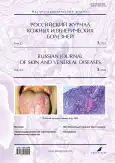Metabolic screening as a tool for assessing the pathogenesis and course of psoriasis
- Authors: Olisova O.Y.1, Kukes V.G.1, Kukes I.V.1, Ignatiev D.V.1, Rogacheva V.V.1
-
Affiliations:
- I.M. Sechenov First Moscow State Medical University
- Issue: Vol 25, No 3 (2022)
- Pages: 201-209
- Section: DERMATOLOGY
- URL: https://journal-vniispk.ru/1560-9588/article/view/109075
- DOI: https://doi.org/10.17816/dv109075
- ID: 109075
Cite item
Abstract
Psoriasis is a chronic, autoinflammatory/autoimmune systemic skin disease. The etiology and pathogenesis of the disease are still unclear. However, Th17/IL-17 activation and abnormalities in the Th17/Treg balance axis are observed in psoriasis, but this pathomechanism does not fully explain the frequent occurrence of metabolic disorders. Therefore, it is necessary to search for better biomarkers in the diagnosis, prognosis and monitoring of comorbid disorders and therapeutic effects in psoriasis.
Metabolomics is a new technology that allows to identify a set of small molecular chemicals involved in metabolism. This method has traditionally been studied with the aim of identifying biomarkers in the diagnosis and prognosis of the disease. Metabolic screening is essential for clinical diagnosis, therapeutic monitoring, predicting the efficacy of psoriasis treatment, and further discovery of new metabolic-based therapeutic targets.
Pharmacometabolomics is aimed at predicting individual differences in response to treatment and in the development of side effects associated with specific drugs.
This review summarizes studies that show responses to drug treatment based on their metabolic profiles obtained before, during, or after therapeutic intervention.
Full Text
##article.viewOnOriginalSite##About the authors
Olga Yu. Olisova
I.M. Sechenov First Moscow State Medical University
Author for correspondence.
Email: olisovaolga@mail.ru
ORCID iD: 0000-0003-2482-1754
SPIN-code: 2500-7989
MD, Dr. Sci. (Med.), Professor
Russian Federation, MoscowVladimir G. Kukes
I.M. Sechenov First Moscow State Medical University
Email: elmed@yandex.ru
ORCID iD: 0000-0002-5112-6928
SPIN-code: 8498-3521
MD, Dr. Sci. (Med.), Professor, Academician of the Russian Academy of Sciences
Russian Federation, MoscowIlya V. Kukes
I.M. Sechenov First Moscow State Medical University
Email: ilyakukes@gmail.com
ORCID iD: 0000-0003-1449-8711
SPIN-code: 1166-3569
MD, Cand. Sci. (Med.), Research Associate
Russian Federation, MoscowDmitry V. Ignatiev
I.M. Sechenov First Moscow State Medical University
Email: dmitrywork@list.ru
ORCID iD: 0000-0001-8751-3965
SPIN-code: 6743-7960
MD
Russian Federation, MoscowVeronika V. Rogacheva
I.M. Sechenov First Moscow State Medical University
Email: rogacheva-90@mail.ru
ORCID iD: 0000-0003-4200-7887
SPIN-code: 6164-1817
Graduate Student
Russian Federation, MoscowReferences
- Yang G, Xia Y, Ren W. Glutamine metabolism in Th17/Treg cell fate: applications in Th17 cell-associated diseases. Sci China Life Sci. 2021;64(2):221–233. doi: 10.1007/s11427-020-1703-2
- De Berardinis RJ, Mancuso A, Daikhin E, et al. Beyond aerobic glycolysis: transformed cells can engage in glutamine metabolism that exceeds the requirement for protein and nucleotide synthesis. Proc Natl Acad Sci USA. 2007;104(49):19345–19350. doi: 10.1073/pnas.0709747104
- Carr EL, Kelman A, Wu GS, et al. Glutamine uptake and metabolism are coordinately regulated by ERK/MAPK during T lymphocyte activation. J Immunol. 2010;185(2):1037–1044. doi: 10.4049/jimmunol.0903586
- Johnson MO, Wolf MM, Madden MZ, et al. Distinct regulation of Th17 and Th1 cell differentiation by glutaminase-dependent metabolism. Cell. 2018;175(7):1780–1795.e19. doi: 10.1016/j.cell.2018.10.001
- Klysz D, Tai X, Robert PA, et al. Glutamine-dependent α-ketoglutarate production regulates the balance between T helper 1 cell and regulatory T cell generation. Sci Signal. 2015;8(396):ra97. doi: 10.1126/scisignal.aab2610
- Lian G, Gnanaprakasam JR, Wang T, et al. Glutathione de novo synthesis but not recycling process coordinates with glutamine catabolism to control redox homeostasis and directs murine T cell differentiation. Elife. 2018;7:e36158. doi: 10.7554/eLife.36158
- Lian N, Shi LQ, Hao ZM, Chen M. Research progress and perspective in metabolism and metabolomics of psoriasis. Chin Med J. 2020;133(24):2976–2986. doi: 10.1097/CM9.0000000000001242
- Gauza-Włodarczyk M, Kubisz L, Włodarczyk D. Amino acid composition in determination of collagen origin and assessment of physical factors effects. Int J Biol Macromol. 2017;104(Pt A):987–991. doi: 10.1016/j.ijbiomac.2017.07.013
- Smith RJ, Phang JM. The importance of ornithine as a precursor for proline in mammalian cells. J Cell Physiol. 1979;98(3):475–481. doi: 10.1002/jcp.1040980306
- Suskova VS, Pinson IY, Olisova OY. Immunopathogenesis of psoriasis. Clin Dermatology Venereology. 2006;(1):68–70. (In Russ).
- Tashiro T, Sawada Y. Psoriasis and systemic inflammatory disorders. Int J Mol Sci. 2022;23(8):4457. doi: 10.3390/ijms23084457
- Bilgiç Ö, Altınyazar HC, Baran H, Ünlü A. Serum homocysteine, asymmetric dimethyl arginine (ADMA) and other arginine-NO pathway metabolite levels in patients with psoriasis. Arch Dermatol Res. 2015;307(5):439–444. doi: 10.1007/s00403-015-1553-3
- Kamleh M, Snowden S, Grapov D, et al. LC-MS metabolomics of psoriasis patients reveals disease severity-dependent increases in circulating amino acids that are ameliorated by anti-TNFα treatment. J Proteome Res. 2015;14(1):557–566. doi: 10.1021/pr500782g
- Kapoor SR, Filer A, Fitzpatrick MA, et al. Metabolic profiling predicts response to anti-tumor necrosis factor α therapy in patients with rheumatoid arthritis. Arthritis Rheum. 2013;65(6):1448–1456. doi: 10.1002/art.37921
- Kang H, Li X, Zhou Q, et al. Exploration of candidate biomarkers for human psoriasis based on gc-ms serum metabolomics. Br J Dermatol. 2017;176(3):713–722. doi: 10.1111/bjd.15008
- Madsen RK, Lundstedt T, Gabrielsson J, et al. Diagnostic properties of metabolic perturbations in rheumatoid arthritis. Arthritis Res Ther. 2011;13(1):R19. doi: 10.1186/ar3243
- Ottas A, Fishman D, Okas TL, et al. The metabolic analysis of psoriasis identifies the associated metabolites while providing computational models for the monitoring of the disease. Arch Dermatol Res. 2017;309(7):519–528. doi: 10.1007/s00403-017-1760-1
- Souto-Carneiro M, Tóth L, Behnisch R, et al. Differences in the serum metabolome and lipidome identify potential biomarkers for seronegative rheumatoid arthritis versus psoriatic arthritis. Ann Rheum Dis. 2020;79(4):499–506. doi: 10.1136/annrheumdis-2019-216374
Supplementary files







